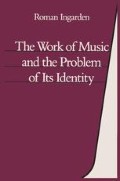Abstract
We are living through the aftermath of psychologism, which still has many followers, particularly in Poland, although elsewhere its grip has been broken and it is seen as a thing of the past.1 Especially to art theorists and musicologists, who themselves take no interest in philosophy yet are inclined to make general assertions regarding the objects of their investigations, it seems almost obvious that a work of art, and especially a musical work, is something “mental”: a cluster of imaginings or auditory experiences. I can almost hear some of my readers saying: why does the author complicate a simple matter? A musical work is above all a certain cluster of sounds with which one associates feelings, thoughts, and imaginings. And, as we learn from physicists and psychologists, sounds are nothing but sense-experiences and therefore mental experiences. The same applies to presentations, feelings, and so-called presentational judgments.
Access this chapter
Tax calculation will be finalised at checkout
Purchases are for personal use only
Preview
Unable to display preview. Download preview PDF.
Editor information
Copyright information
© 1986 Jean Gabbert Harrell
About this chapter
Cite this chapter
Ingarden, R. (1986). The Musical Work and Conscious Experiences. In: Harrell, J.G. (eds) The Work of Music and the Problem of Its Identity. Palgrave Macmillan, London. https://doi.org/10.1007/978-1-349-09254-3_3
Download citation
DOI: https://doi.org/10.1007/978-1-349-09254-3_3
Publisher Name: Palgrave Macmillan, London
Print ISBN: 978-1-349-09256-7
Online ISBN: 978-1-349-09254-3
eBook Packages: Palgrave Literature & Performing Arts CollectionLiterature, Cultural and Media Studies (R0)

